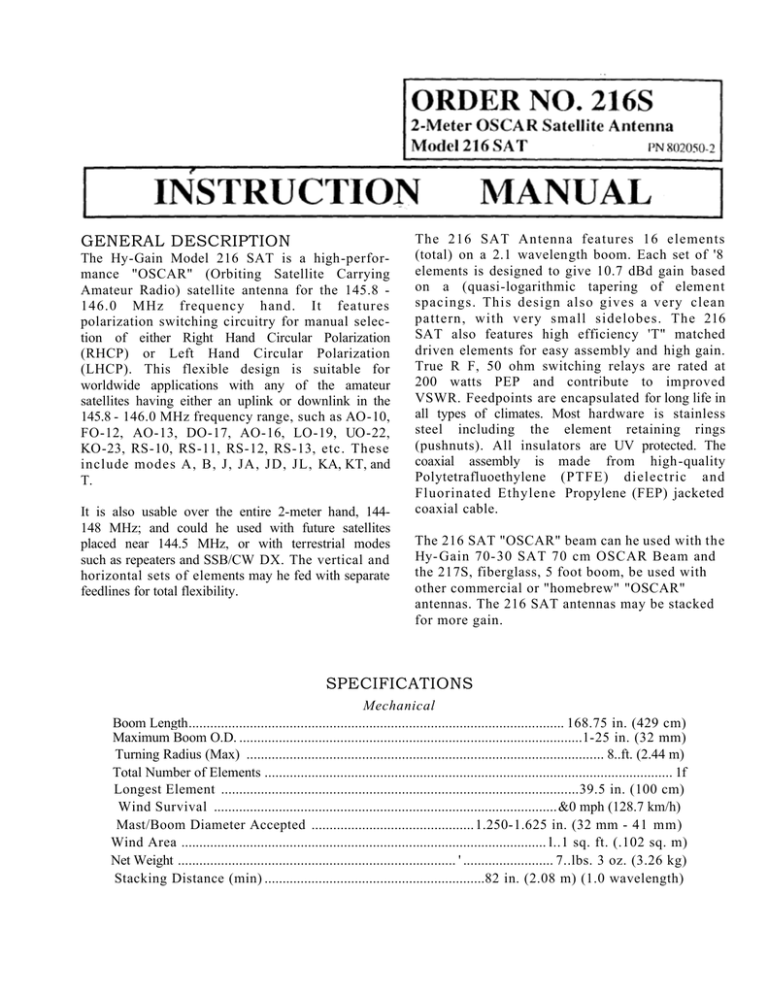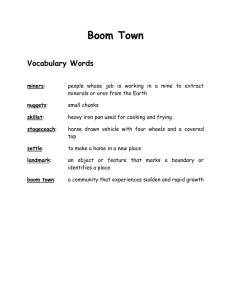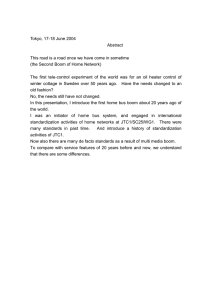
GENERAL DESCRIPTION
The Hy-Gain Model 216 SAT is a high-performance "OSCAR" (Orbiting Satellite Carrying
Amateur Radio) satellite antenna for the 145.8 146.0 MHz frequency hand. It features
polarization switching circuitry for manual selection of either Right Hand Circular Polarization
(RHCP) or Left Hand Circular Polarization
(LHCP). This flexible design is suitable for
worldwide applications with any of the amateur
satellites having either an uplink or downlink in the
145.8 - 146.0 MHz frequency range, such as AO-10,
FO-12, AO-13, DO-17, AO-16, LO-19, UO-22,
KO-23, RS-10, RS-11, RS-12, RS-13, etc. These
include modes A, B, J, JA, JD, JL, KA, KT, and
T.
It is also usable over the entire 2-meter hand, 144148 MHz; and could he used with future satellites
placed near 144.5 MHz, or with terrestrial modes
such as repeaters and SSB/CW DX. The vertical and
horizontal sets of elements may he fed with separate
feedlines for total flexibility.
The 216 SAT Antenna features 16 elements
(total) on a 2.1 wavelength boom. Each set of '8
elements is designed to give 10.7 dBd gain based
on a (quasi-logarithmic tapering of element
spacings. This design also gives a very clean
pattern, with very small sidelobes. The 216
SAT also features high efficiency 'T" matched
driven elements for easy assembly and high gain.
True R F, 50 ohm switching relays are rated at
200 watts PEP and contribute to improved
VSWR. Feedpoints are encapsulated for long life in
all types of climates. Most hardware is stainless
steel including the element retaining rings
(pushnuts). All insulators are UV protected. The
coaxial assembly is made from high-quality
Polytetrafluoethylene (PTFE) dielectric and
Fluorinated Ethylene Propylene (FEP) jacketed
coaxial cable.
The 216 SAT "OSCAR" beam can he used with the
Hy- Gain 70- 30 SAT 70 cm OSCAR Beam and
the 217S, fiberglass, 5 foot boom, be used with
other commercial or "homebrew" "OSCAR"
antennas. The 216 SAT antennas may be stacked
for more gain.
SPECIFICATIONS
Mechanical
Boom Length........................................................................................................ 168.75 in. (429 cm)
Maximum Boom O.D. ...............................................................................................1-25 in. (32 mm)
Turning Radius (Max) ................................................................................................... 8..ft. (2.44 m)
Total Number of Elements ................................................................................................................. 1f
Longest Element ...................................................................................................39.5 in. (100 cm)
Wind Survival ...............................................................................................&0 mph (128.7 km/h)
Mast/Boom Diameter Accepted .............................................1.250-1.625 in. (32 mm - 41 mm)
Wind Area ..................................................................................................... l..1 sq. ft. (.102 sq. m)
Net Weight ............................................................................. ' ......................... 7..lbs. 3 oz. (3.26 kg)
Stacking Distance (min) .............................................................82 in. (2.08 m) (1.0 wavelength)
PREPARATION FOR ASSEMBLY
FOR OUR OVERSEAS CUSTOMERS: If you
use the Metric System, see the AmericantoMetric Conversion Table in the rear of this
manual. Most illustrations in this manual will
provide both American and Metric dimensions.
Choose a moderate-sized clear area to assemble the 216 SAT OSCAR Beam. The area
must be at least 5' x 5' (1.5 x 1.5 m) for each
boom section. A bench vise is recommended to
hold the booms while the elements are being
installed. An alternate method is to drive a 5' (1.5
m) length of mast material into the ground and
attach the entire boom and boom-to-mast bracket
to this mast temporarily during assembly
If you assemble this antenna over a grassy area,
precautions should be taken so that hardware is
not accidentally lost during assembly. A concrete
driveway is an excellent area for assembly.
Tools: The following loots are required for easy
assembly of the 216 SAT OSCAR Bean:
One nut driver should have a hollow handle.
This can be used for pushing on the pushnuts.
Standard wrenches or adjustable wrenches may
also be used in place of the nut drivers.
When unpacking your antenna, check inside of all
tubing for small parts and elements. To conserve
space, these smaller articles are sometimes put
inside larger pieces. Check all parts against the
parts list in the rear of this manual to ensure no
parts are missing.
Make all measurements to the given dimensions,
plus or minus, no more than 1/16 inch! The
assembly of this antenna will be easier if you
read this manual completely through at least twice
and follow the recommended directions. Allow at
leas'_ 4 hours for assembly.
BOOM ASSEMBLY
Select the boom sections, boom-to-mast bracket
parts and hardware as shown in Figure 1.
Identify the boom sections by their length and
diameter, and identify the mating ends from the
dimensions shown in Figure 1. Assemble the
boom sections and boom-insert with the
hardware as shown, and tighten securely.
NOTE: Another complete set of element
mounting holes exists in the vertical plane and is
not shown in Figure 1. This set has element
mounting holes which are offset approximately 20
1/4 inches towards the front of the boom
assembly. This is 1/4-wave (90 degrees) at 146
MHz.
() Copyright by Brian Beezley
*Gain and Patterns verified by Yagi Optimizer 4.0` and
NEC, and by measurements of full size antennas on Hy Gain's antenna range.
ASSEMBLY OF OTHER ELEMENTS
Select the two reflector elements, 3/16" x 39 1/2"
(Item 1), marked with 2 black bands near one
end of each. Also select four insulators (Item 21)
and four - 3/16" pushnuts (Item 28).
After assembly, the boom-to-mast bracket may be
rotated on the boom so that after mounting, the
elements are in an "X" configuration. Securely
tighten the 1/4"-20 x 3/4" hardware. When the
bracket is in the desired position.
r
ASSEMBLY OF DRIVEN ELEMENTS
Select the four (4) driven element halves, 7/16" x
18 1/2" (Item 12), T-Bar (Item 13), boom-toelement strap (Item 14), and driven element
clamps (item 22) and associated hardware as
shown in Figure 2.
Install the reflector elements on the rear boom as
shown in Figure 2. Push one of the element
insulators (Item 21) onto each reflector, so that its
shoulder is 19 1/8" from the nearest end. Insert
the long end of each reflector into the
reflector mounting holes, as shown in Figure 2.
Item No.
1
2
3
10
12
13
14
20
21
23
24
25
26
28
29
30
32
34
38
Assemble the two driven elements to the boom as
shown in Figure 2. The distance from the boom
to the edge of the driven element clamps (Item
22) should be 8 5/16" (21 cm). Securely tighten
all hardware. When the coax/switch assemble is
installed later, you will decide on either LHCP or
RHCP from the unswitched polarization.
Figure 2
Assembly of Driven Elements,
Reflectors and Directors to Boom
-4
Description
Reflector, 3/16"x 391/2"
D1, 3/16" x 35 1/2"
D2, 3/16" x 35 1/4"
Boom, rear, 11/4" x 56"
Driven Element, 7/16"x 181/2"
T-bar, 3/8"x 9"
Strap, boom-to-element
Caplug, 7/16"
Insulator, element
Bolt, #10-24 x 1/2", hex head
Bolt, #10-24 x 11/2 -, hex head
Bolt, #10-24 x 1", hex head
Bolt, 1/4"-20 x 3/4", hex head
Pushnut, 3/16"
Nut, #10-24, hex
Nut, 1/4"-20, hex
Lockwasher, 1/4" internal
Lockwasher, #10 internal
Bolt, #10-24 x 2"
Slide another element insulator over the other
end of the reflectors and push it onto each element until it seats into the mounting hole. Each
element insulator should fit snugly into the
mounting hole. Recheck the exposed length of
the reflector and reposition if necessary.
Carefully slip the 3/16 inch pushnuts (Item 28)
over each end of the two (2) reflectors, and
push them along each element until they are
snug against each element insulator. Check the
exposed lengths of each reflector during this
process, to ensure the correct dimensions.
NOTE: You may wish to use a hollow handled
nut driver or a short length of tubing to help
push on the element insulators and pushnuts. If
you accidentally slide a pushnut on too far, then
you should cut it off the element and try again
with one of the spare pushnuts.
Item
No.
1
2
3
4
5
6
7
Part No.
Element
160067
160068
160069
160070
160071
160072
160073
R
D1
D2
D3
D4
D5
D6
Total
Length
Inch
39 1/2
35 1/2
35 1/4
35
34 3/4
341/2
34 1/4
Select one each of elements D1 and D2. Identify these elements by the length and color
bands listed in Table 1. Install these elements
on the rear boom section in the horizontal set of
holes shown in Figures 1 and 2. Start with D 1
adjacent to the driven element. Use the insulators and pushnuts, and assemble in the same
manner as described earlier.
Select one element - D1. Install this element on
the rear boom section in the vertical set of holes
shown in Figure 2. Dl is adjacent to the vertical
driven element. Use the insulators, pushnuts
and methods as described for the other elements.
Select one each of elements - D3, D4, D5 and
D6. Install these elements on the front and midboom sections in the horizontal set of holes shown
in Figures 1 and 3.
mm
1003
902
895
889
883
876
870
ExposedLength
Inch I mm
19 1/8
17 1/8
17
16 7/8
16 3/4
1611/16
16 9/16
486
435
432
429
425
424
421
1
Table 1
Element Length & Color Band Identification
Color
Band
Black (2)
Brown
Red
Orange
Yellow
Green
Blue
A0-0216-C - 0 0 3
Item No
3
4
5
6
7
8
9
Description
D2, 3/16" x 35 1/4"
D3,3/16" x 35"
D4, 3/16" x 34 3/4"
D5,3/16" x 34 12"
D6, 3/16" x 34 1/4"
Boom, front, 1 1/8" x 57 1/4
Boom, mid, 1 1/4" x 57 I2" "
Figure 3
Assembly of Directors to Boom
Select the remaining elements - D2, D3, D4, D5 and
D6. Install these elements on the front and midboom sections in the remaining holes in the vertical
plane. Refer to Figure 3.
After the installation of all elements, check each
exposed length from Table 1. Also check each
set of elements to make sure they are in the
proper order. If any element has to he adjusted
or moved, there are extra pushnuts supplied for
partial reassembly.
ATTACHMENT OF COAX ASSEMBLY
Select the coax/circularity-switch assembly (Item
17), the No. 8 hardware (Items 35, 36, and 37), and
the No. 10 hardware (Items 23, 29, and 34). Attach
one of the two sets of terminals to the front driven
element's T-hars (Item 13), as shown in Figure 4.
T h e N o . K- 32 x 1/2 bolt is used with the square
lug, and the No. 10-24 x 1/2 bolt is used with the
round lug. To achieve proper phasing, attach the
feedpoint solder lugs as shown in Figures 5 and 6.
Use black electrical tape, and secure this
The other coaxial cable coming from the
coaxial cable to the boom on both sides of the
coupler tube should go around the boom and
rear D1 element. loop backwards to attach its terminals to the rear driven element's T-bars, as
shown in Figure 4. Use black electrical tape to
secure
r
this coaxial cable and the extra loops of small
coax.
Item No.
17
23
29
34
35
36
37
Figure 4
Attachment of Coax Assembly
-7
Description
Coax Assembly, OSCAR 145 MHz
Bolt, #10-24 x 1/2"
Nut, #10-24 hex head
Lockwasher, #10 internal
Bolt, #8-32 x 1/2
Lockwasher #8, internal
Nut, #8-32, hex
AO-2165-A-005
NOTE: Looking at rear end
of boom and encapsulated feed points.
Figure 5
Feedpoint Orientation for LHCP
in the Unswitched Mode
AO-216S-A-006
NOTE: Looking at rear end
of boom and encapsulated
feed points.
Figure
Feedpoint Orientation
for 6RHCP
in the Unswitched Mode
NOTE: To achieve LHCP in the unswitched
mode, the feedpoint solder lugs should be positioned as shown in Figure 5. To achieve RHCP
in the unswitched mode, the feedpoint solder
lugs should be positioned as shown in Figure 6.
The opposite polarization results when 10-14
volts DC is applied to the red and black wires.
The black wire is at ground potential, and is
directly connected to the shield of the coax,
therefore a single wire may be used to switch
this antenna if the minus (-) side of the switch
power supply is connected to the shield of the
coax in the "shack".
Either LHCP or RHCP will result if these attachment procedures are not followed (random
attachment). The opposite polarity results when
switched.
Each set of elements may be used independently
for vertical and horizontal polarization if separate
connections are made to each of the driven
element's T-bars. Each set of eight elements will
require its own feedline to the "shack". Each will
produce 11.5 dBd gain.
The connections to each driven element would
require a 4:1 coaxial balun and a split-coax feed.
The "OSCAR" coax assembly should be
removed and saved for later use.
Table 2
VSWR Chart
INSTALLATION
The 216 SAT OSCAR Beam may be center
mounted, and a fiberglass or other type of nonconducting boom must be used to achieve
circular polarity. The boom-to-mast bracket will
fit booms with 11/4" - 15/8" diameters.
The DC switching cables and feedline must be
routed off the rear of the boom to achieve circular polarity. A low loss cable such as Belden
8214 or 9913 should be used with UHF (PL259) connectors.
WARNING:
Do Not allow any part of the antenna to
touch power lines. This could cause severe
burns or fatal injuries.
When mounting the 216 SAT OSCAR Beam
above any other antennas, allow at least 6.5 feet for
clearance of the rear boom.
When mounting the 216 SAT OSCAR Beam on a
common horizontal boom with other beams,
allow at least 5 feet (center-to-center). The elements should be at a 45 degree angle with
respect to the boom. This will minimize interaction between the antennas
NOTE: If you plan to use large diameter, heavy
coaxial cable or if it is likely that the cables may
accumulate ice, you will need to adjust the position of the boom-to-mast bracket on the 2
meter antenna boom for a good balance. This
bracket is shown between horizontal elements
D3 and D4. It may be placed behind the
horizontal D3, so that the elevation rotator can
turn freely in both directions through the
desired range. In addition, counterweights may
need to be added to the front of the booms (if
the 70cm beam is also used) in extreme cases.
The coaxial cables should be secured high on
the vertical support mast to minimize the unsupported weight.
SERVICE INFORMATION
If you are unable to resolve technical problems,
you should contact the Telex/Hy-Gain Customer Service Department in Minneapolis,
Minnesota.
You should retain your sales receipt or other
proof of purchase for antennas that are still
under warranty. (See separate sheet for Telex
Warranty.)
For ordering replacement parts contact:
Telex/Hy-Gain Telex
Communications, Inc. 8601 N.E.
Highway 6 P.O. Box 5579
Lincoln, NE. 68505
ATTN: Customer Service Department
Phone: (402) 467-5321
All requests, inquiries or warranty claims
should be made to:
Amateur Department
Telex Communications, Inc.
9600 Aldrich Avenue South
Minneapolis, MN 55420
Phone: (612) 884-4051 or (612)
887-5528 or (800) 328-3771
PARTS LIST
Item
No.
1
2
3
4
5
6
7
8
9
10
11
12
13
14
15
16
17
18
19
20
21
Part No.
160067
160068
160069
160070
160071
160072
160073
173183
173184
173185
173186
173187
173188
160055
385142-1
385144-1
877888
Description
Qty
Reflector, 3/16" x 39 1/2" ..................................................................... 2
D1, 3/16" x 35 1/2..................................................................................... 2
D2, 3/16" x 35 1/4 .................................................................................... 2
D3, 3/16" x 35" ........................................................................................ 2
D4, 3/16" x 34 3/4..................................................................................... 2
D5, 3/16" x 34 1/2" .................................................................................. 2
D6, 3/16" x 34 1/4"................................................................................... 2
Boom, front, 11/8" x 57 1/4"................................................................. 1
Boom, mid, 11/4" x 57 1/2"................................................................... 1
Boom, rear, 11/4 x 56" ........................................................................ :1
Boom splice, 11/8" x 4 .......................................................................... 1
Driven element, 7/16" x 18 1/2" ........................................................... 4
T-bar, 3/8" x 9" ........................................................................................ 4
Boom-to-element strap ........................................................................ 4
Clamp, boom-to-mast ........................................................................... 1
Plate, back-up
Coax Assembly, OSCAR 145 MHz ................................................... 1
877886
Parts Pack 216S - Insulators.................................................................. 1
450421
455630
455644
460337
877887
22
23
24
25
26
27
28
29
30
160074
500158
500159
504069
505266
380809
550081
554071
554099
Caplug, 11/8". blue ................................................................................ 1
Caplug, 11/4", black............................................................................... i
Caplug, 7/16", black.............................................................................. 4
Insulator, element
.7
Parts Pack 216S - Hardware ............................................................... 1
Clamp, driven element ......................................................................... 4
Bolt, #10-24 x 1/2", hex head ............................................................... 8
Bolt, #10-24 x 11/2", hex head ............................................................. 4
Bolt, #10-24 x 1", hex head ................................................................. 4
Bolt, 1/4"-20 x 3/4" .................................................................................. 8
U-bolt, 5/16" - 18 x 15/8 ...................................................................... 2
Pushnuts, 3/16" I.D ............................................................................ 40
Nut, #10-24, hex ................................................................................. 20
Nut, 1/4"-20, hex ..................................................................................... 8
-10-
PARTS LIST (Continued)
Item
No.
31
32
33
34
35
36
37
38
Part No.
877881
555747
562961
564792
565697
500185
560035
550063
500157
Description
Parts Pack 216S - Hardware (Continued)
Qty
Nut, hex, 5/16"-18 ..............................................................................4
Lockwasher, 1/4" internal .................................
Lockwasher, split, 5/16" ...................................................................8
Lockwasher, #10 internal ............................................................. 20
Bolt, #8-32 x 1/2"............................................................................... 2
Lockwasher, #8 internal ................................................................. 2
Nut, #8-32, hex ................................................................................ 2
Bolt, # 10-24 x 2"................................................................................ 2
FRACTION AND METRIC EQUIVALENTS
FOR ONE INCH
r
Fractional
Inch
Millimeters
Fractional
Inch
Millimeters
1/16
1/8
3/16
1/4
5/16
3/8
7/16
1 /2
1.588
3 175
4.700
6.350
7.937
9.525
11112
12.700
9/16
5/8
11/16
3/4
13/16
7/8
15/16
1
14288
15.875
17 463
19 050
20.638
22.225
23813
25 400
Table 2
Fraction And Metric Equivalents
For One Inch
PRINTED IN U.S.A.
Copyright © 1993 by Telex
TELEX COMMUNICATIONS, INC. All
rights reserved.
11 JAN 1993
GENERAL DESCRIPTION
The Hy-Gain 217S is a high-strength fiberglass
boom m designed to support circular polarized
antennas for "OSCAR" communications. The
217S OSCAR-Boom features non-resonant
metal sleeves at each end that allow
tightening of antenna boomto-mast brackets
without crushing the boom. The OSCARBoom also features adjustableposition metal
sleeves for the elevation rotator's clamps.
This allows the OSCAR antenna system to be
completely balanced on the elevation rotator,
therefore increasing its
reliability. The 3 OSCAR-Boom has a
maximum O.D. of 1 / 8 inches (35 mm), which
allows it to work with both the Alliance
U100/U110 rotators and the KENPRO KR500/KR-5400 rotators.
SPECIFICATIONS
Mechanical
Boom Length ...................... 60 in. (152.4 cm)
Maximum Boom O.D................ 13/a in. (35 mm)
_Antenna Mounting
Sleeve Length ...................... 4 in. (102 mm)
Figure 1
Example of Boom Application
INSTRUCTION MANUAL
GENERAL DESCRIPTION
The Hy-Gain Model 70-30 SAT is a high-performance "OSCAR" (Orbiting Satellite Carrying
Amateur Radio) satellite antenna for the 432-438
MHz frequency band. It features polarization
switching circuitry for manual selection of
either Right Hand Circular Polarization (RHCP) or
Left Hand Circular Polarization (LHCP). This
flexible design is suitable for worldwide applications
with any of the amateur satellites having either
an uplink or downlink in the 432-438 MHz frequency
range such as AO-10, FO-12, AO-13, UO-14, AO16,
LO-19, AO-21, UO-22, KO-23, etc. These
include modes B, J, JA, JD, JL, L and S.
The 70-30 SAT antenna features 30 elements (total)
on a 4.2 wavelength boom. Each set of 15 elements is
designed to give 14.0 dBd gain based upon the NBS
Tech Note 688. The 70-30 SAT also features high
efficiency "Delta" matched driven elements for easy
assembly and rugged durability. True RF 50 ohm
switching relays are rated at 200 watts and contribute
to improved VSWR. Feed points are encapsulated for
long life in all types of climates.
Most hardware is stainless steel including the element pushnuts. All insulators are UV protected. The
coaxial assemblies are made from high-quality
Polytetrafluoroethylene (PTFE) dielectric and
Fluorinated Propylene (FEP) jacketed coax cable.
The 70-30 SAT "OSCAR" antenna can be used with
the Hy-Gain 216 SAT 2-meter "OSCAR"
antenna and the 217S fiberglass 5 foot boom, or it
can be used with other commercial or homebrew
"OSCAR" antennas. The 70-30 SAT antennas may be
stacked for more gain.
PREPARATION FOR ASSEMBLY
FOR OUR OVERSEAS CUSTOMERS: If you use
the Metric System, see the American-to- Metric
Conversion Table in the rear of this manual. Most
illustrations in this manual will provide both
American and Metric Dimensions.
Choose a moderate-sized clear area to assemble the
70-30 SAT Oscar Beam. The area must be at least
24" x 63" for each boom section.
SPECIFICATIONS
Mechanical
Boom Length ........................................................................................................134 in. (340.4 cm)
Maximum Boom O.D ............................................................................................ 1.125 in (28.6 mm)
Turning Radius (Max) ............................................................................................71.25 in (181 cm)
Total Number of Elements ...................................................................................................................30
Longest Element ........................................................................................................... 13 in. (33 cm)
Wind Survival ...................................................................................................80 mph (128.7 km/h)
Mast/Boom Diameter Accepted ............................................... 1.250 - 1.625 in (32 mm - 41 mm)
Wind Area .....................................................................................................0.75 sq. ft. (.0697 sq. m)
Net Weight ..........................................................................................................4 lbs 14 oz (2.21 kg)
Stacking Distance (Min) .......................................................46 inches (1.17m) (1.7 wavelengths)
SPECIFICATIONS
Electrical
Frequency Range .........................................................................................................432-438 MHz
Gain ...................................................................................................................................... 14.0 dBdc
Beamwidth ....................................................................................................................28-30 degrees
Front-to-Back Ratio ....................................................................................................................25 dB
Ellipticity .............................................................................................................................3 dB Max.
Power Rating ....................................................................................................................200 W/PEP
Connector .................................................................................................................................Type N
Polarity Switch Voltage and Current Requirements ................................ 9-15 VDC @ 30-60 mA
VSWR (435-437 MHz) ....................................................Less than 1.5 when using fiberglass boom
A bench-vise with jaws no wider than 6 inches is
recommended to hold the booms while the elements
are being installed. An alternate method is to drive
a 5' (1.5 m) length of mast material into the ground
and attach the entire boom and boomto-mast
bracket to this mast temporarily during assembly.
If you assemble this antenna over a grassy area,
protection should be taken so that hardware is not
accidentally lost during assembly. A concrete
driveway is an excellent area for assembly.
Tools: The following tools are required for easy
assembly of the 70-30 SAT OSCAR Beam:
QTY
1
1
1
1
1
Tool Type
Tape Measure, 12 ft.
Nut Driver, 1/2 in.
Nut Driver, 7/16 in.
Nut Driver, 3/8 in.
Nut Driver, 11/32 in.
A 3/8 inch by 6 inch tube (Item 35) is supplied to help
install the insulators and pushnuts. Standard
wrenches or adjustable wrenches may also be used in
place of nut drivers.
When unpacking your antenna, check inside of all
tubing for small parts and elements. To conserve
space, these smaller articles are sometimes put
inside larger pieces. Check all parts against the parts
list in the rear of this manual to ensure no parts are
missing.
Make all measurements to the given dimensions,
plus or minus, no more than 1/16 inch! The assembly of this antenna will be easier if you read this
manual completely through at least twice and follow
the recommended directions. Allow at least 4 hours
for assembly.
ASSEMBLY OF THE BOOM-TOMAST
BRACKETS AND BOOM
Select the boom-to-bracket parts, boom sections and
mast bracket parts as shown in Figure 1. Lineup the
holes in the 3 boom sections as shown. The front and
rear boom sections should meet at the center of the
boom insert (Item 13).
NOTE: Another complete set of element mounting
holes exist in the vertical plane and is not shown in
Figure 1. This set has identical spacings between holes
but is offset approximately 6 3/4 inches towards the
rear of the boom assembly. This is 1/4 wave (90
degrees) at 435 MHz.
After assembly, the boom-too-mast bracket may be
rotated on the boom so that after mounting, the
elements are in an "X" configuration. Securely
tighten the 1/4" - 20 x 3/4" hardware when the
bracket is in the desired position. Securely tighten
the #10 - 24 x 1 1/2" bolt which holds the coax
support boom to the rear boom.
ASSEMBLY OF DRIVEN ELEMENTS
Select the two (2) driven elements, 3/16" x 12
1/4", marked with a single black color band need
one end of each. Also select the insulators and
pushnuts as shown in Figure 2.
Push one of the element insulators (Item 19)
onto each Driven Element (DE) so that its
shoulder is 5 9/16" from the nearest end (as
shown in Figure 3). Insert the long end of each
DE into the driven element mounting holes on
the rear boom section, as shown in Figure 2.
Slide another element insulator (Item 19) over
the other end of the DE's, and push it onto each
element until it seats into the mounting hole.
Recheck the exposed length of the DE's and
reposition if necessary.
Carefully slip the 3/16 inch pushnuts (item 27)
over each end of the two (2) driven elements, and
push them along each element until they are
snug against each element insulator. Check the
exposed length of each DE during this
process, to ensure the correct dimensions.
NOTE: You may wish to use the short length of
tubing to help push the element insulators and
pushnuts. If you accidentally slide a pushnut on
too far, then you should cut it off the element
and try again with one of the spare pushnuts.
Select the DE T-Bars (Item 20), and 3/16 inch
tubing clamps (Item 21), and associated
hardware. Assemble these parts to the driven
elements as shown in Figures 3 and 4. When
the coax assembly is installed later you will
decide on either LHCP or RHCP for the unswitched polarization. See Figures 6 and 7.
AO-0215-C-002
11
27
D1
Item No.
2
11
12
19
27
Description
Driven Element, 3/16" x 12 1/4"
Boom, rear, 1 1/8"x 60"
Boom, coax support
Insulator, element
Pushnut, 3/16" I.D.
Figure 2
Driven Element Location and Assembly
A O- 0 2 1 5 - 8 - 0 0 3
20
Item No.
2
11
19
20
21
Description
Driven Element, 3/16"x 12 1/4"
Boom, rear, 11B" x 60"
Insulator, element
Driven element, T - bar
Clamp, 3/16" tubing
Item No.
23
26
27
31
Description
Bolt, #8-32 x 1/2", round head
Nut, #8-32, hex
Pushnut, 3/16" I.D., stainless
Lockwasher, #8 internal
Figure 3
Driven Element T-Bar Assembly
Figure 4
Orientation of Driven Element Connection
ASSEMBLY OF OTHER ELEMENTS
Select the two (2) reflector elements, 3/16" x 13",
marked with two black bands near one end of each.
Also select four (4) insulators and four (4) pushnuts.
Install the reflector elements in the reflector
mounting holes as shown in Figure 2. Use the same
methods as described for the driven elements along
with the exposed length given in Table 1.
Select one each of elements - D1, D2, D3, D4 and D5.
Identify these elements by the length and color bands
listed in Table 1. Install these elements on the rear
boom section in the horizontal set of holes shown in
Figure 1 and 2. Start with D1 adjacent to the driven
element. Use the insulators and pushnuts and
assemble in the same manner as described earlier.
Item
No
1
2
3
4
5
6
7
8
9
Select one each of elements - Dl, D2, D3, D4, D5,
and D6. Install these elements on the rear boom
section in the vertical set of holes shown partially in
Figure 2. Start with D 1 adjacent to the horizontal
driven element. Use the insulators and pushnuts and
assemble in the same manner as described earlier.
Select one each of elements - D6, D7, D8, D9, D10,
D 112, and D13. Install these elements on the
front boom section in the horizontal set of
holes shown in Figure 1.
NOTE: The front boom section has 8 sets of holes in
the "horizontal plane" and 7 sets of holes in the
"vertical plane".
Select the remaining elements - D7, D8, D9, D10, D
11, D 12, and D 13. Install these elements on the
front boom section in the remaining holes in the
vertical plane.
Total Length
Part No.
160057
160058
160060
160061
160062
160063
160064
160065
160066
R
DE
D1/D2
D3
D4
D5
D6
D7
D8-D13
Inch
13
12 1/4
11 3/4
115/8
111/4
113/16
11 1/16
10 15/16
10 13/16
mm
330
311
298
295
286
284
281
278
275
Exposed Length
Color
515/16
59/16
55/16
51/4
51/16
51/32
431/32
429/32
427/32
Band
Black (2)
Black
Brown
Orange
Yellow
Green
Blue
Violet
(None)
151
141
135
133
129
128
126
125
123
Table 1
Element Length & Color Band Identification
After the installation of all elements, check each
exposed length from Table 1. Also check each
set of 15 elements to make sure the elements are
in the proper order. If any element has to be
adjusted or moved, there are extra pushnuts
supplied for partial reassembly.
ATTACHMENT OF COAX ASSEMBLY
Select the coax/circularity switch assembly
(Item 16) and the remainder of the No. 8
hardware (Items 23,26 and 31). Attach one of the
two sets of terminals to the front Driven
Element's T-bars (Item 20) as shown in Figures 5
and 6.
Item No.
1
2
3
11
12
16
20
21
23
26
31
Use black electrical tape, and secure this
coaxial cable to the boom at two locations between the elements. See Figure 5.
The other coaxial cable coming from the
coupler tube should make a single loop and its'
terminals should attach to the rear DE's T-bars, as
shown in Figure 5. Use black electrical tape to
secure this coaxial cable,
NOTE: To achieve LHCP in the unswitched
mode, the feedpoint solder lugs should be positioned as shown in Figure 6.
Description
Reflector, 3/16"x 13"
Driven Element, 3/16"x 12 1/4"
D1 and D2,3/16"x 11 3/4"
Boom, rear, 11/8' x 60"
Boom, coax support, 1" x 12"
Coax assembly, Oscar 435 MHz
Driven Element T-bar
Clamp, 3/16" tubing
Bolt, #8-32x 1/2"
Nut, #8-32, hex
Lockwasher, #8 internal
21 (4 PLACES)
Figure 5
Attachment Of Coax Assembly
A0-0215-A-008
NOTE: Looking at rear
end of boom and encapsulated feed points.
Figure 6
Feedpoint Orientation for LHCP
in the Unswitched Mode
AO-0215-A-009
NOTE: Looking at rear
end of boom and encap sulated feed points.
Figure 7 Mode
in the Unswitched
Feedpoint Orientation for RHCP
To achieve RHCP in the unswitched mode, the
Either LHCP or RHCP will result if these at
feedpoint solder lugs should be positioned as
atttachment procedures are not followed
(random
shown in Figure 7. The opposite polarization
attachment). The opposite polarity results
results when 9-15 volts DC is applied to the red
when switched. In no case, will linear polarity
and black wires. The black wire is at ground
result if both Driven Elements are fed.
potential, and is directly connected to the shield
of the coax, therefore a single wire may be used
to switch this antenna if the minus (-) side of the
switch power supply is connected to the shield
of the coax in the shack.
Frequency (MHz)
Table 2
VSWR Chart
INSTALLATION
RAIN:
The 70-30 SAT OSCAR-Beam may be centered
mounted, and a fiberglass or other type of nonconducting boom must be used to achieve circular
polarity. The boom-to-mast bracket will fit booms
with 1 1/4" - 15/8" diameters.
During and after a rain shower water droplets may
collect on the elements. These droplets will cause the
elements to appear electrically longer (lower in
frequency) and may affect the gain and VSWR.
You may wish to wipe any excess oil off the elements before assembly. This will help the elements
shed water faster. Also, after a rain shower, rotate
or shake the antenna to shake off the water droplets.
The DC switching cables and feedlines must be
routed off the rear of the boom to achieve circular
polarity. A low loss cable such as Belden 8214 or
9913 should be used with Type N connectors.
Service Information
WARNING:
DO NOT allow any part of the antenna to
touch power lines. This could cause severe
burns or fatal injuries.
When mounting the 70-30 SAT OSCAR Beam
above any other antennas, allow at least 6 feet for
clearance of the rear boom.
When mounting the 70-30 SAT OSCAR Beam on a
common horizontal boom with other beams, allow at
least 5 feet (center-to-center). The elements should be
at a 45 degree angle with respect to the boom. This
will minimize interactions between the antennas.
If you are encounter technical problems and need
assistance, you should contact Hy-Gain Customer
Service Department.
All requests, inquires, warranty claims, or for
ordering replacement parts, contact:
Hy-Gain
308 Industrial Park Road Starkville,
Mississippi 39759 USA Phone: 662323-9538 FAX: 662-323-6551
PARTS LIST
Item
No.
1
2
3
4
5
6
7
8
9
10
11
12
13
14
15
16
17
18
19
20
21
22
23
24
25
26
27
28
29
30
31
32
33
34
35
36
Part No.
160057
160058
160060
160061
160062
160063
160064
160065
160066
173177
173178
173179
173180
385142-1
385144-1
877885
877883
450401
450421
460337
877884
173220
358705
500159
500185
505266
380809
550063
550081
554071
554099
555747
560035
562961
564792
565697
179720
179728
Description
Qty
Reflector, 3/16" x 13" ............................................................................ 2
Driven Element, 3/16" x 12 1/4" .......................................................... 2
D1, D2, 3/16" x 11 3/4"- ............................................................................................................ 4
D3, 3/16" x 115/8"...4 ............................................................................ 2
D4, 3/16" x 11 1/4" ................................................................................ 2
D5, 3/16" x 113/16 " .............................................................................. 2
D6, 3/16" x 11 1/16" .............................................................................. 2
D7, 3/16" x 10 15/16" ............................................................................ 2
D8 - D13, 3/16" x 10 13/16" ................................................................ 12
Boom, Front, 1 1/8" x 62 11/16" ........................................................... 1
Boom, Rear, 1 1/8" x 60" ...................................................................... 1
Boom, coax support, 1" x 12" .............................................................. 1
Boom insert, 1 1/4" x 6" ........................................................................ 1
Clamp, Boom-To-Mast ......................................................................... 1
Back-up Plate ......................................................................................... 1
Coax Assembly, OSCAR 435 MHz ......................................................... 1
Parts Pack 215S - Insulators ................................................................... 1
Caplug, 1 inch, black ............................................................................. 1
Caplug, 1 1/8" inch, blue ....................................................................... 1
Insulator, element ................................................................................ 62
Parts Pack 215S - Hardware .................................................................. 1
Driven Element T bar ............................................................................. 4
Tubing Clamp, 3/16 inch........................................................................ 4
Bolt, #10-24 x 1 1/2", hex head ............................................................. 3
Bolt, #8-32 x 1/2" ................................................................................... 8
Bolt, 1/4"-20 x 3/4", hex head ............................................................... 4
U-bolt, 5/16" x 15/8 " ............................................................................. 2
Nut, #8-32 hex ....................................................................................... 8
Pushnut, 3/16" LD ................................................................................90
Nut, #10-24 hex ..................................................................................... 3
Nut, 1/4"-20 hex ..................................................................................... 4
Nut, 5/16"-18 hex ................................................................................... 4
Lockwasher, #8 internal ......................................................................... 8
Lockwasher, 1/4" internal ...................................................................... 4
Lockwasher, 5/16" ................................................................................. 4
Lockwasher, #10 internal ...................................................................... 3
Pushtube 3/8 x 6" ................................................................................... 1
Boom splice, 1 1/4" x 6" ......................................................................... 1
METRIC CONVERSION
Converting American measurements to Metric:
Using the scale below to identify lengths of bolts,
diameters of tubes, etc. The American inch (1")
and foot (1') can be converted in this way.
1 inch (1") = 2.54 cm
1 foot (1') = 30.48 cm Example: 42" x 2.54 = 106.7
cm
FRACTION AND METRIC EQUIVALENTS
FOR ONE INCH
Fractional
Inch
Fractional
Inch
Millimeters
1/16
1.588
9/16
14.288
1 /8
3/16
3.175
4.700
6.350
7.937
9.525
11.112
12.700
5/8
11/16
3/4'
13/16
7/8
15/16
1
15.875
17.463
19.050
20.638
22.225
23.813
25.400
114
5/16
3/8
7/16
112
Millimeters





